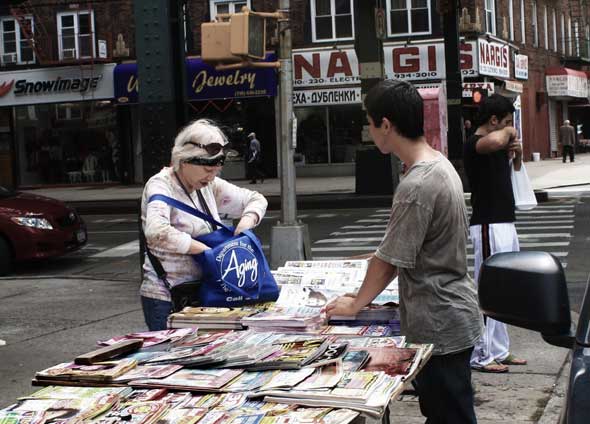Brighton Business Leader Bids To Curb Street Vendors

A Brighton Beach business leader has had it with legal and illegal vendors competing with brick-and-mortar stores with higher overhead, but attempts to keep them under control is made more difficult by the medley of city agencies tasked with overseeing them.
Ever since Yelena Makhnin became executive director of the Brighton Beach Improvement District nine years ago, she has had to deal with street vendors who benefit from lower operating costs and little regulation along the half-mile stretch of Brighton Beach Avenue, where they set up shop to take advantage of the heavy pedestrian traffic on most days.
“Restaurants, as well as other stores along Brighton Beach Avenue, pay taxes to conduct their businesses, and that expense makes it harder to compete with street vendors who may get the occasional small fine,” Makhnin said.
Though Makhnin is up to the challenge of monitoring their legality, doing so is made difficult since vendor licenses are handled by a variety of city and state agencies. The Department of Consumer Affairs, for example, regulates and issues licenses required for vending general merchandise, and the Department of Health regulates and issues licenses and permits for food-related street vending. One of the toughest impediments comes from the state, which regulates vendors who are veterans of the nation’s Armed Services, and those licenses are routinely abused, Makhnin said.
For the most part, completely unlicensed vendors are no longer a problem. Working in conjunction with the 60th Precinct, Makhnin said illegal hucksters were largely kicked out of the neighborhood. But legitimate street vendors continue to pose problems when they disregard the laws enacted by the city and state.
She pointed out that the city has designated Brighton Beach Avenue as a Zero Visibility Zone, meaning that street vendors cannot set up on the avenue, only on side streets – but that hardly hampers the hawking.
That’s unfair to brick-and-mortar businesses that are barred from doing business in front of their stores without a Stoop Line Stand license, costing up to $200 every two years. Even that license only allows them to display certain goods in a limited space in front of their business. Any items purchased at that spot are supposed to be paid for inside the store, but Makhnin notes that the businesses she represents sometimes skirt that requirement.
Still, though some vendors may appear to be operating legitimately, they could be manipulating an archaic 19th Century state law that allows disabled military veterans to be vendors and exempt from municipal regulations.
One flower vendor, for example, sets up on Coney Island Avenue, next to the Chase Bank building on the southeast corner. It is licensed to a veteran, according to Makhnin, but he does not actually operate the business. Makhnin mentioned that though the street vendor is licensed, his proximity to established flower shops along the avenue cut into those merchants sales.
“Some merchants skirt the law by coaxing veterans to seek a license and then leasing the space from them for their own business purposes,” Makhnin said. “[State legislators need to] clearly define the [terms] of the licenses granted to veterans.”
Luckily for Makhnin, Albany politicians are already on the road to doing that. The State Senate has twice approved a bill to make impersonating disabled veteran vendors “by carrying or possessing a specialized vending license without authority or any form of insignia or by words or actions” a Class A misdemeanor. But that bill has failed to pass the Assembly twice, and has been tabled for fine-tuning.
That kind of punishment – which could include imprisonment of up to one year – is more along the hard line Makhnin wants to see the city and state take. Currently, they’re often issued small fines, which she said the vendors see as “the cost of doing business” – and a much lower cost than paying rent or paying employees. Makhnin believes vendors that receive repeated violations should have their licenses suspended or revoked.
Another problem is street vendors who leave trash when they close up shop for the day, which leaves nearby businesses responsible for removing it or face sanitation violations from the city.
Makhnin understands that street vendors “aren’t a priority for police, who have much, more serious crimes to deal with, or health department inspectors” and does not want to see them banned.
“However,” she added, “if small businesses are so vital for the local economy, as city officials and politicians typically claim, then more should be done to ensure licensed street vendors operate within the strict guidelines and only in sanctioned designated areas.”
Most of all, Makhnin, said, “The overall street vendor situation is being neglected by the city. More regulations aren’t needed, just stricter enforcement of the current ones and a stricter limit to the number of licenses issued.”




